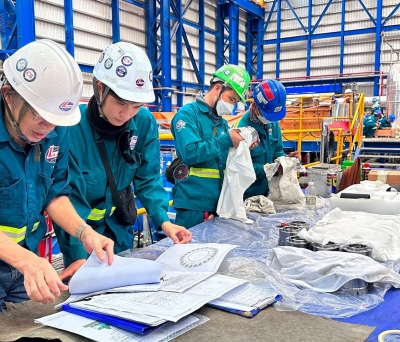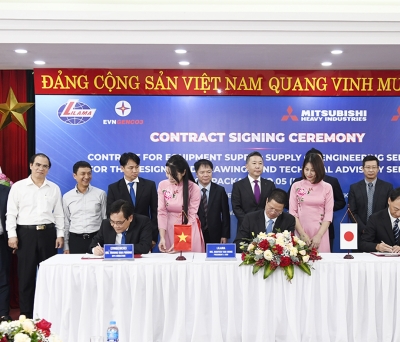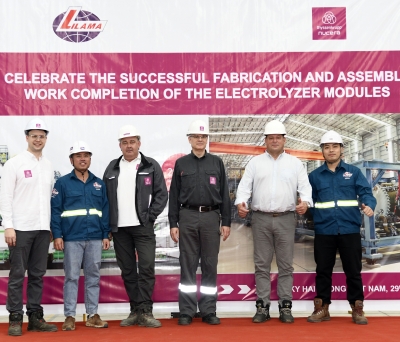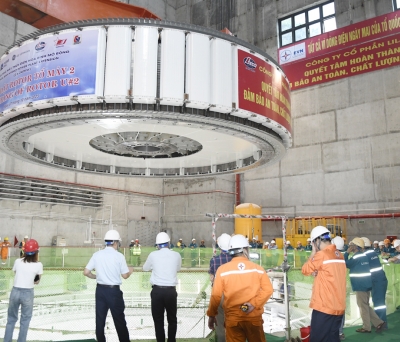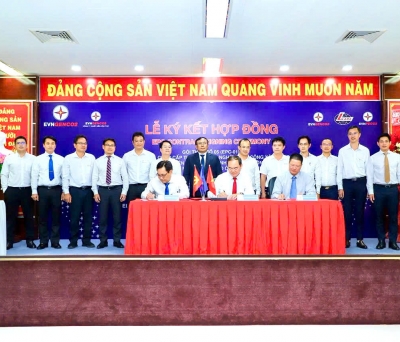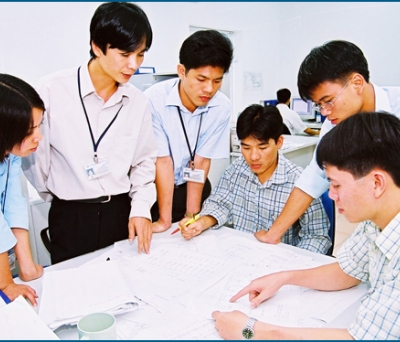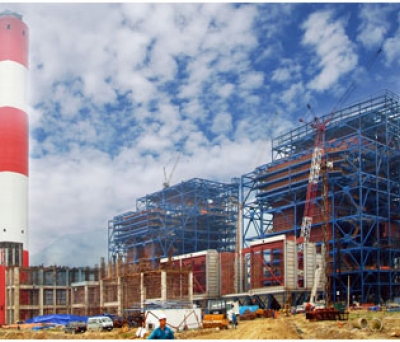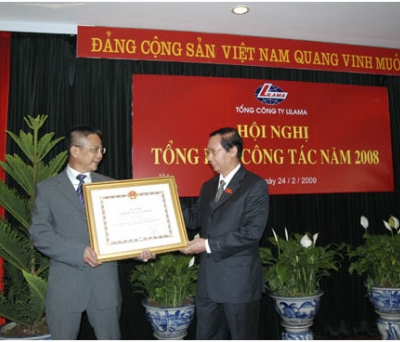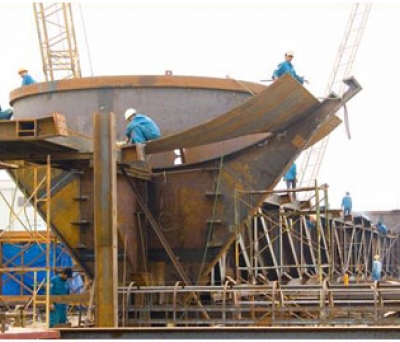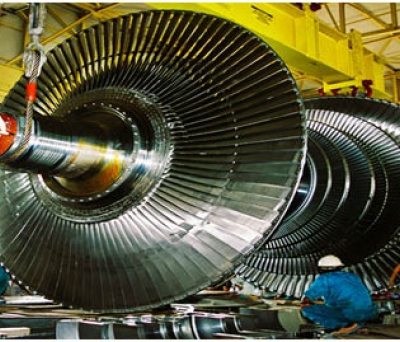Re-establishing the position of Vietnamese mechanical branch (continued and the end) (*)
Article 2: Beginning to innovate in thinking - We must affirm that the ground for developing mechanical branch is still large. The annual production value achieves approximately USD 16 billion, the growth rate is about 20% per year, however, the ability to satisfy the need of interiorization only reach 35%. While waiting for new, suitable supporting policies, levels and branches from the Centre to local areas and each mechanical enterprize should enter strongly into the market, especially they need to change from their thinking to way of performance.
Re-establishing Vietnamese mechanical branch (Instalment I)
Escaping from non-specializing "shirt"
First of all, each enterprize should define that it can not cling to the budget "milk" forever in the condition of too limited domestic resources. Lilama General Director Le Van Tuan told us that there had been some foreign firms who ordered domestic mechanical enterprizes many times to manufacture export equipment, but the orders were less and less and this "battlefield" was usually omitted. In fact, when foreign companies came to order, although with small quantity, some enterprizes' leaders were not aware adequately of the importance of this work, they did business in the type of "hit-or-miss", the quality was ensured only for the first time, so many customers never returned. Some enterprizes just specialized in old markets, manufacturing equipment for cement plants, hydro-power plants... whereas these markets became narrower and narrower, and in the future, when all markets were open according to trade agreements, they could fall into the situation of serious lack of jobs.
Subjectively, a lot of Vietnamese mechanical enterprizes had the habit of relying on the state, living in the environment of "begging-being given" mechanism, and their dependence were very high. So it was time those enterprizes needed to escape bravely and actively from the way of doing business without specialization. Hardships in capital resources could be solved only through re-organizing programmes, speeding up enterprize equitization, concentrating to enhance labour productivity, reducing expenditures and cost prices. At the same time, they should expand and search for markets of exporting mechanical equipment in the direction of participating in global equipment supplying system in order to create more added values and supplement resources for development. For the time being, one member company of Lilama had enough capabilities to manufacture, export mechanical equipment with the value of approximately VND 400 billion in 2014, they had manufatured cold steel laminating furnace for an Italian partner and equipment of gantry crane for a German customer. This showed that we have domestic capabilities but how would we do?
With the moment trend of integration, it is difficult for mechanical products to "squeeze" into the global value string, not including competitive abilities. Actually, domestic mechanical enterprizes cannot compare their potentials and experience with foreign businesses. That is why, to forward linking mechanical enterprizes with eachother is very necessary to create a collective power, enough strong to compete in the market. PV Shipyard General Director Phan Tu Giang said, his company had required some businesses who supplied foreign equipment to link with domestic enterprizes to manufacture a part or the whole equipment in Vietnam, ensuring the quality and satisfying the owner's requirements. For example, the main equipment of power generators had to be purchased from foreign countries, but auxiliary equip. like oil-rig soles, cooling systems... could be manufactured, produced, installed by actively linking enterprizes inside & outside the country, provided that they had to ensure the standards, quality and competitive prices.
With previous oil-rig Tam Dao 03, his company had interiorized approximately 35% of equipment and he hoped in next projects, the percentage would be raised upto 40 and 45% of the value. However, linking domestic enterprizes with eachother, especially small and medium ones was still loose, making difficulty to enhance the rate of interiorization. They could produce components and spare parts, but not a complete product. Moreover, to achieve the standards of installing equipment on oil-rigs, enterprizes had to be issued necessary certificates, while most of them changed slowly and lacked specialization, losing their chances although his company had requested foreign firms to split equipment so that the Vietnamese mechanical components could be installed.
It is necessary to have a suitable policy
Each year, we cannot count how many meetings, forums on the development of mechanical branch to be organized and discussed. Prime Minister had issued Instruction No. 16/CT-TTg on extricating difficulties and speeding up to implement the strategy of Vietnamese mechanical development. He requested Ministry of Industry and Commerce to preside over and coordinate with concerning ministries & branches to set up and submit amendments, supplements suitable for requirements of mechanical development to the government. Simultaneously, he assigned Vami to coordinate closely with state managing organs to propose policies for developing mechanical branch, guide and regulate the member enterprizes to intensify their cooperation, linking with eachother and specializing in production so as to raise the competition of Vietnamese mechanical products. However, the results were not as expectation.
Sharing the experience of Korea in developing its mechanic industry, General Director of Doosan Heavy Industries Co., Ltd. in Vietnam Mr Ryu Hang Ha emphasized, the core thing was that we had to maintain a fixed level of protection for domestic mechanical products by methods such as setting up a technical fence for imported products, appointing contractors in fields of construction and mechanics. For main important projects, it was agreed from the Centre to local areas that domestic products had to be used priorly and domestic enterprizes should have a sence of using products of eachother. State managing organs should study and extricate the pending matters arising form Bidding Law by organizing bids of domestic equipment prior to international biddings.
Having a look at Japan, the protection policy of this country is just tighter, for example, it is not allowed to import equipment of thermal power plants, of port cranes though the domestic price is 150 times as expensive as those in the market. Mr Ryu Hang Ha proposed, in Vietnam, it was very necessary to have a clear and compulsory stipulation for the proportion of bidding package value for domestic contractors. This made foreign contractors adjust and support domestic ones to meet project requirements. Also, a list of main important mechanical products being given preferential treatment should be proposed in order to avoid troubles in procedures with tax organizations and customs. Top priority mechanism had to be researched for new products with long-term usage, highly applicable in pratice and having potential markets. We should assign capable enterprizes to perform EPC bidding packages, have financial policies in favour of owners and priorly use main important mechanical products, etc.
According to Vami Chairman Nguyen Van Thu, for extrication in policies, the most important thing was the thinking on mechanical branch. In fact, even some leading levels were not aware adequately and exactly of the importance and contributions silent, dogged and long-term of mechanical branch to the development of national stature. For this reason, it was necessary to have a renovated thinking, unanimous and penetrated in setting up and deploying the support mechanism for mechanical branch, avoiding the situation of "policy is one thing and deployment is another", lack of supervision & extrication to the every roots. In the short term, mechanical enterprizes should intensify their cooperation inside and outside the country, step by step became prestigious sub-contractors. From that point, they would accumulate experience, finance for re-investment in research. As for Vami, they were concentrating to propose solutions in favour of products and limiting projects, supporting policies for development, standards for mechanical products so as to purge products which didnot attain standard; setting up technical fences to protect mechanical products, especially the main important ones with potentiality. Simultaneously, they were also concentrating to invest in research because it was the indispensable way to bring about far more profits than doing outwork.
A sorrow fact is that in many meetings to discuss "saving" the mechanical branch, if there are no leaders from the State or ministries & branches to attend, the meetings are just forums for mechanical enterprizes and some managing organs of Industrial Commercial Ministry, and rarely a representative from banks appears. That is why, proposals are only internal matter forever, and the necessary partners to extricate hardships and deal with problems are absent. As planned, the potentialities of mechanical branch are still very large. Up to year 2025, we need about USD 300 billion for clue projects, including nearly 60 thermal power plants with total investment capital of USD 120 billion. Domestic mechanical enterprizes are responsible only for 30% of the work volume, they will have turnover of approximately USD 40 billion. And if the banks donot jointly jump on the bandwagen, the USD 40 billion will fall into others. A marginal story which mechanical enterprizes usually share is that if the mechanical branch had received the same supporting package of VND 30 thousand billion for real estate, surely, it wouldnot have had difficulties recently, even some businesses are self-confident to compete equally with the neighboring nation China who has "crushed" internal mechanics just inside our country.
(*) See People Newspaper from Edition dated 26-1
-------------
Jobs of mechanical branch in the future are plentiful
According to some estimations and forecasts, job resources in manufacturing oil-rigs, building ships will change the direction to Southeast Asia and Vietnam where are now the outstanding potential markets. So it is very necessary to create a close link among mechanical enterprizes and links among banks to have flexible, suitable policies of loan because mechanical projects usually need very big capital resources, and it is difficult for a bank to give them a total loan.
PHAN TU GIANG
PV Shipyard General Director
-------------
Preferential treatment for internal businesses in bidding
Imported material and equipment to create fixed assets for manufacturing main important mechanical products should be applied a preferential import tax of 0%. Exempt or reduce tax to a minimum of 50% for importing material, components and spare-parts to manufacture main important mechanical products... At the same time, raise preferential treatment in bidding for domestic contractors who have enough capabilities. Set up stipulations for protecting domestic mechanical products.
TRAN VAN QUANG
General Director of Dong Anh electrical equipment Company
Le Xuan Thuy (People Newspaper)


